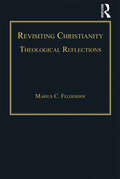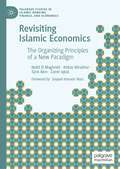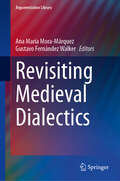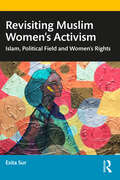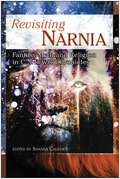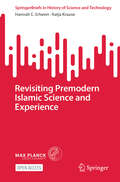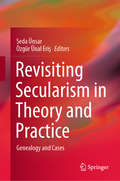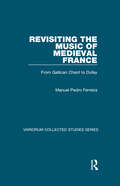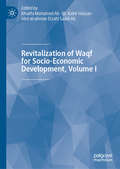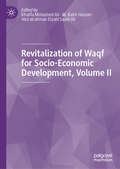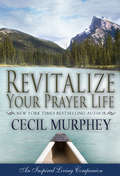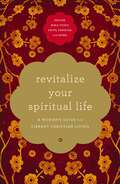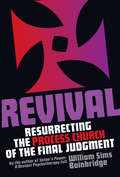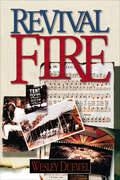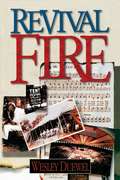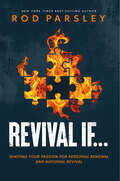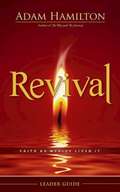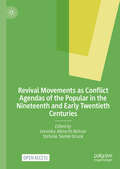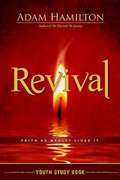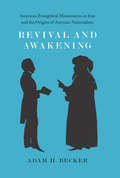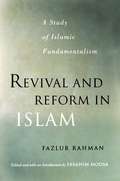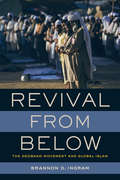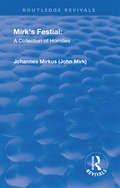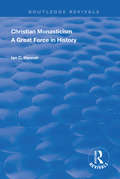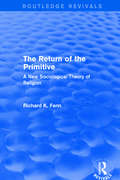- Table View
- List View
Revisiting Christianity: Theological Reflections
by Marius C. FelderhofThis book presents a view of Christianity and Christian thinking that draws on some key thinkers from Plato to Wittgenstein and represents a thoughtful 'common sense' theology offered as an alternative to the anti-intellectualism of many contemporary Christians and to the distortions of Christianity provided by some of the most vocal critics. Seeking to make accessible some traditional Christian thinking and practices that are rooted in the desire to make the most of life, Felderhof highlights the additional Platonic corollary that unless we have learned to live well, we shall not properly understand, thus presuming the mutual interdependence of theory and practice. Felderhof portrays how Christian theology is to do with making sense of what Christians do and how generally we are best advised to live. This is an invaluable introduction to key themes for students and a wide range of readers.
Revisiting Islamic Economics: The Organizing Principles of a New Paradigm (Palgrave Studies in Islamic Banking, Finance, and Economics)
by Abbas Mirakhor Zamir Iqbal Nabil El Maghrebi Tarık AkınThis book discusses the need for a paradigm shift from Islamic economics universe of discourse to Iqtisād, a socio-economic system that is entirely independent from other economic doctrines and systems of thought. It provides an overview of critiques of the science and dogma of mainstream, orthodox, neoclassical, or simply Economics, with its axioms of rationality, scarcity, and unlimited wants. There is also a critical analysis of Islamic economics, and its failures to set its own policy agenda and development objectives. Our contention in this book is that Iqtisād--the Qur’an’s vision of how the economy is to be arranged—provides such a paradigm with a radically different philosophical foundation from that of Economics to the point that makes grafting one onto the other Impossible. Iqtisād offers a genuine and authentic Islamic paradigm with unique etymological and philosophical foundations. It is a unique system that derives its organizing principles from the principal source of the Quran, rather than Economics. The logical coherence of its immutable system of rules compliance, institutional structures, and risk-sharing relations provides the foundations for economic dynamism, financial stability, and shared prosperity. It ensures that resources are efficiently managed, poverty is eradicated, income and wealth mal-distributions are corrected, and the internal sources of economic injustices gripping human societies are eliminated. The Impossibility Theorem proposed in this book implies that, metaphysically, ontologically, epistemologically, axiologically, and teleologically, the two polar cases of Iqtisād and Economics are so radically different to rule out any grafting of one onto the other in order to present an intermediate paradigm with a synthetic discipline called Islamic economics. Given its multidisciplinary contents, this book will be of interest to a wide audience, including economists, policymakers, philosophers, theologians, and jurists, and can guide also free-thinking readers to a clarity of understanding about the conditions of humanity and the imperative of change with a sincerity of purpose and coherence in knowledge.
Revisiting Medieval Dialectics (Argumentation Library #44)
by Ana María Mora-Márquez Gustavo Fernández WalkerThis book presents a collection of essays by prominent young researchers and established scholars on the medieval reception of Aristotle&’s Topics in the Latin, Arabic and Hebraic traditions, as well as on its late-ancient sources in Alexander of Aphrodisias and Boethius. The book thus provides a fruitful engagement with the late-ancient to medieval reception of the Topics, a tradition that has been understudied in recent scholarship. The collected contributions revisit the reception of the Topics focusing on historical analyses of dialectics as a general method of argumentation and as a scientific method. The authors studied in this book range from well-known figures such as Alexander, Boethius, Buridan and Avicenna, to the lesser-known Radulphus Brito, Judah ben Shlomo ha Kohen, and Ibn Tumlus. This book is an important contribution to the study of argumentation theory in the historical past and is of interest to scholars of the historical development of dialectical argumentation and argumentation theorists.
Revisiting Muslim Women’s Activism: Islam, Political Field and Women’s Rights
by Esita SurThis book traces the evolution of organisational activism among Muslim women in India. It deconstructs the 'Muslim woman' as the monolith based on tropes like purdah, polygamy, and tin talaq and compels the reader to revisit the question of Muslim women’s individual and collective agency. The book argues that the political field, along with religion, moulds the nature and scope of Muslim women’s activism in India. It looks at the objectives of four Muslim women’s organisations: the Bazm-e-Niswan, the Awaaz-e-Niswaan, the Bharatiya Muslim Mahila Andolan and the India International Women’s Alliance (IIWA), in close interaction with the political landscape of Mumbai. The book explores the emergence of gender-inclusive interpretation of Muslim women’s rights by Muslim women activists and challenges the dominant and reductionist stereotypes on Muslim women, community, and absolutist ideas of Islam. It argues that Muslim women are not passive victims of their culture and religion, rather they can develop a critique of their marginality and subjugation from within the community. Revisiting Muslim Women’s Activism traces the evolution of a community-centric approach in women’s activism and records a fragmented view on women’s rights from within the community and religious leadership. It also delineates the distinctiveness of this activism that considers religion and culture as resources for empowerment and as sites of contestations. Moreover, the book documents the narratives of Muslim women’s struggle and resistance from their location and lived experiences. It will be of interest to students and researchers of women’s studies, gender studies, political science, sociology, anthropology, law, and Islamic studies.
Revisiting Narnia: Fantasy, Myth And Religion in C. S. Lewis' Chronicles
by Shanna CaugheyTheologians, psychologists, academics, feminists, and fantasists offer humor, insight, and fresh perspectives on the enchanting and beloved Chronicles of Narnia series. Such contributors as fantasists Sarah Zettel and Lawrence Watt-Evans, children's literature scholar Naomi Wood, and C.S. Lewis scholars Colin Duriez and Joseph Pearce discuss topics such as J.R.R. Tolkien and Middle Earth's influence on the conception of Narnia, the relevance of allegory for both Christians and non-Christians, the idea of divine providence in Narnia, and Narnia's influence on modern-day witchcraft. Fans of the wildly popular series will revel in the examination of all aspects of C.S. Lewis and his magical Narnia.
Revisiting Premodern Islamic Science and Experience (SpringerBriefs in History of Science and Technology)
by Katja Krause Hannah C. ErlweinThis open access book takes a fresh look at the nature and place of experience in premodern Islamic science. It seeks to answer two questions: What kind of experience constituted premodern Islamic science? And in what ways did that experience constitute science? Answering these questions, the authors critique the trajectory of most existing histories of the period, which tend to reduce “experience” to empirical method or practice. This view reflects the emphasis that histories of modern science, especially of the Scientific Revolution, have placed on empiricism—the standard against which Islamic actors were then measured. This book offers a new historiography, arguing that experience had a far wider scope in the world of Islamic science. Combining an innovative theoretical framework with three case studies and a reflective epilogue by renowned experts in the field, this work offers the history of science a solid foundation on which to build its analyses of premodern science and the modality, scope, and role of experience therein. As a result, it speaks to specialists in the history of premodern Islamic science and historians of science in general to reconsider their historiographical assumptions.
Revisiting Secularism in Theory and Practice: Genealogy and Cases
by Seda Ünsar Özgür Ünal ErişThis book offers a philosophical and macro-historical analysis of secularism, supported by an investigation of various contemporary cases. Starting with an in-depth theoretical discussion of the meaning of secularism, it subsequently presents a historical study on the secularization of norms and identities in Europe. The respective case studies cover topics such as the epistemologies of secularism, liberalization and embedded secularism, the relationship between modernity and secularism, the socio-anthropology of secularism, Turkish modernization as a cultural revolution, the political economy of secularism in Turkey, and the secular rationale of the EU neighborhood policy.
Revisiting the Music of Medieval France: From Gallican Chant to Dufay (Variorum Collected Studies #1007)
by Manuel Pedro FerreiraThis book presents together a number of path-breaking essays on different aspects of medieval music in France written by Manuel Pedro Ferreira, who is well known for his work on the medieval cantigas and Iberian liturgical sources. The first essay is a tour-de-force of detective work: an odd E-flat in two 16th-century antiphoners leads to the identification of a Gregorian responsory as a Gallican version of a seventh-century Hispanic melody. The second rediscovers a long-forgotten hypothesis concerning the microtonal character of some French 11th-century neumes. In the paper "Is it polyphony?" an even riskier hypothesis is arrived at: Do the origins of Aquitanian free organum lie on the instrumental accompaniment of newly composed devotional versus? The Cistercian attitude towards polyphonic singing, mirrored in musical sources kept in peripheral nunneries, is the subject of the following essay. The intellectual and sociological nature of the Parisian motet is the central concern of the following two essays, which, after a survey of concepts of temporality in the trouvère and polyphonic repertories, establish it as the conceptual foundation of subsequent European schools of composition. It is possible then to assess the real originality of Philippe de Vitry and his Ars nova, which is dealt with in the following chapter. A century later, the role of Guillaume Dufay in establishing a chord-based alternative to contrapuntal writing is laboriously put into evidence. Finally, an informative synthesis is offered concerning the mathematical underpinnings of musical composition in the Middle Ages.
Revitalization of Waqf for Socio-Economic Development, Volume I
by M. Kabir Hassan Khalifa Mohamed Ali Abd elrahman Elzahi Saaid AliThis book explores the various aspects of Waqf management in IsDB member countries/jurisdictions as well as in non-Muslim majority countries. Topics covered include Waqf regulation, its modernization and relationship to Maqasid Al-Shari’ah; performance of Waqf activities; time and activity-wise distribution of Waqf resource management; the antecedents and consequences of Waqf assets (both physical and cash); the strategies and models to promote Waqf-related activities for greater socio-economic development; good governance practices through the formulation of informed policies for Waqf projects; the confluence of Waqf, zakah, charity, and Islamic microfinance impacting socio-economic development and so on. Comprising different issues and perspectives adopted by various authors/researchers, the book is specifically designed to meet the needs of academics and industry practitioners in the field of Islamic finance to provide general and Shari’ah guidelines on the emerging issues within the subject.
Revitalization of Waqf for Socio-Economic Development, Volume II
by M. Kabir Hassan Khalifa Mohamed Ali Abd elrahman Elzahi Saaid AliThis book provides a comprehensive analysis of Waqf management and its impact on socio-economic development, specifically financial inclusion and sustainable development as well as of the legal issues in Waqf management in IsDB member countries and jurisdictions. It explores various aspects of Waqf management in IsDB member countries/jurisdictions as well as in non-Muslim majority countries such as Waqf regulation, its modernization, and relationship to Maqasid Al-Shari’ah; performance of Waqf activities; time and activity-wise distribution of Waqf resource management; the antecedents and consequences of Waqf assets (both physical and cash); the strategies and models to promote Waqf related activities for greater socio-economic development; good governance practices through the formulation of informed policies for Waqf projects, among others. Comprising different issues and perspectives adopted by various researchers, the work is specifically designed to meet the needs of academics and industry practitioners in the field of Islamic finance.
Revitalize Your Prayer Life: An Inspired Living Companion
by Cecil MurpheyDo you desire a better understanding of God? Do you want a glimpse into His personality? Are you ready for a more intimate relationship with Him and a richer prayer life? In Revitalize Your Prayer Life, veteran author Cecil Murphey invites you on a quest to discover the nature, character, and attributes of God and offers thought-provoking lessons and insights that will draw you nearer to Him. With honesty and transparency, Murphey allows you an insider's view of his struggles with prayer and shows how he discovered the invigorating joy of praying anywhere, anytime. Let the pages written by this seasoned Christian stir up your spirit and help change your focus. Not only will you experience a refreshing difference in your communication with God, but you'll put an end to devotional boredom as well.
Revitalize Your Spiritual Life: A Woman's Guide for Vibrant Christian Living
by Thomas NelsonLife changes constantly, Jesus doesn't. Do you ever think . . . How did I get this life? Will I ever really feel free? Why isn't my faith stronger? Why can't I measure up? Take heart. This isn't how the story ends. An inspiring and indispensable collection, Revitalize Your Spiritual Life taps into the conversations taking place in every woman's heart. With compassion, hope, wit, and wisdom, some of today's most inspired authors reveal how faulty thinking, fear, insecurities, guilt, and the quest for perfection keep us from experiencing God's presence and abundance.
Revival
by William Sims BainbridgeReligion is alive and well in the modern world, and the social-scientific study of religion is undergoing a renaissance. For much of this century, respected social theorists predicted the death of religion as inevitable consequence of science, education, and modern economics. But they were wrong. Stark and Bainbridge set out to explain the survival of religion. Using information derived from numerous surveys, censuses, historical case studies, and ethnographic field expeditions, they chart the full sweep of contemporary religion from the traditional denominations to the most fervent cults. This wealth of information is located within a coherent theoretical framework that examines religion as a social response to human needs, both the general needs shared by all and the desires specific to those who are denied the economic rewards or prestige enjoyed by the privileged. By explaining the forms taken by religions today, Stark and Bainbridge allow us to understand its persistence in a secular age and its prospects for the future,
Revival Fire
by Wesley DuewelFire blazes from heaven, and a stone altar erupts in flame. So begins a spiritual awakening, the kindling of a revival fire still burning today. Beginning with Elijah and God's tremendous one-day revival of Israel, Wesley Duewel tells stories of revivals spanning the globe from America to China to Africa, all brought by obedience and heartfelt prayer. He illustrates how God has used revival fire through the centuries to revive the church and reveal the glorious presence of the Holy Spirit.
Revival Fire
by Wesley L. DuewelFire blazes from heaven, and a stone altar erupts in flame. So begins a spiritual awakening, the kindling of a revival fire still burning today. Beginning with Elijah and God's tremendous one-day revival of Israel, Wesley Duewel tells stories of revivals spanning the globe from America to China to Africa, all brought by obedience and heartfelt prayer. He illustrates how God has used revival fire through the centuries to revive the church and reveal the glorious presence of the Holy Spirit.
Revival If...: Igniting Your Passion for Personal Renewal and National Revival
by Rod ParsleyCould it be that God is giving us one last opportunity to allow His Spirit to be poured out upon the earth before the return of Jesus? This book will stir you to fan the flames of revival in your own heart so you can partner with the Holy Spirit and fellow believers to see a sweeping move of God transform America and the world.Are we living in the last days? Is it possible that God is getting ready to pour out His Spirit on the earth one last time before Jesus returns? In Revival...IF, best-selling author Rod Parsley gives readers a road map for cultivating renewal in their own hearts and minds and for participating in spiritual revival on a national scale. Drawing from over forty years of experience with revival personally and in ministry, Parsley: Clarifies what revival is and what it is notExplains the difference between revival and awakeningIncludes historical accounts and current perspectives on various revivals While the methods of revival may change, the message remains the same. This book shares timeless, biblical truths that will empower believers to seize the moment and experience true, lasting revival and personal renewal.
Revival Leader Guide: Faith as Wesley Lived It (Revival)
by Adam HamiltonJoin Adam Hamilton for a six-week journey as he travels to England, following the life of John Wesley and exploring his defining characteristics of a Wesleyan Christian. Wesley’s story is our story. It defines our faith and it challenges us to rediscover our spiritual passion.The Leader Guide contains everything needed to guide a group through the Revival Bible study program. Includes session plans and discussion questions, as well as multiple format options.
Revival Movements as Conflict Agendas of the Popular in the Nineteenth and Early Twentieth Centuries
by Veronika Albrecht-Birkner Stefanie Siedek-StrunkThis open access book focuses on the potential for conflict between high and low culture during the transformations of the popular in the field of religion in the nineteenth and early twentieth centuries. Specifically, the contributors to this edited collection consider the so-called 'Revival Movements' that came up as a symptom of differentiation and pluralisation of Protestantism in reaction to the Enlightenment, rationalism, and criticism of religion, and explore the attempts at theological self-empowerment of Christian laymen and laywomen.
Revival Youth Study Book: Faith as Wesley Lived It (Revival)
by Adam HamiltonJoin Adam Hamilton for a six-week journey as he travels to England, following the life of John Wesley and exploring his defining characteristics of a Wesleyan Christian. Wesley’s story is our story. It defines our faith and it challenges us to rediscover our spiritual passion.Everything needed to conduct a six-week study and help youth grades 6-12 define what the Christian life looks like through the eyes of a Wesleyan Christian. Can be used with the adult-level DVD.
Revival and Awakening: American Evangelical Missionaries in Iran and the Origins of Assyrian Nationalism
by Adam H. BeckerMost Americans have little understanding of the relationship between religion and nationalism in the Middle East. They assume that the two are rooted fundamentally in regional history, not in the history of contact with the broader world. However, as Adam H. Becker shows in this book, Americans--through their missionaries--had a strong hand in the development of a national and modern religious identity among one of the Middle East's most intriguing (and little-known) groups: the modern Assyrians. Detailing the history of the Assyrian Christian minority and the powerful influence American missionaries had on them, he unveils the underlying connection between modern global contact and the retrieval of an ancient identity. American evangelicals arrived in Iran in the 1830s. Becker examines how these missionaries, working with the "Nestorian" Church of the East--an Aramaic-speaking Christian community in the borderlands between Qajar Iran and the Ottoman Empire--catalyzed, over the span of sixty years, a new national identity. Instructed at missionary schools in both Protestant piety and Western science, this indigenous group eventually used its newfound scriptural and archaeological knowledge to link itself to the history of the ancient Assyrians, which in time led to demands for national autonomy. Exploring the unintended results of this American attempt to reform the Orient, Becker paints a larger picture of religion, nationalism, and ethnic identity in the modern era.
Revival and Reform in Islam: A Study of Islamic Fundamentalism
by Fazlur RahmanThis authoritative book argues that what is considered today to be Islamic fundamentalism is inconsistent with the true meaning of this faith. Rahman demonstrates that the true roots of Islamic teachings advocate adaptability, creativity, and innovation.
Revival from Below: The Deoband Movement and Global Islam
by Brannon D. IngramThe Deoband movement—a revivalist movement within Sunni Islam that quickly spread from colonial India to Pakistan, Afghanistan, Bangladesh, and even the United Kingdom and South Africa—has been poorly understood and sometimes feared. Despite being one of the most influential Muslim revivalist movements of the last two centuries, Deoband’s connections to the Taliban have dominated the attention it has received from scholars and policy-makers alike. Revival from Below offers an important corrective, reorienting our understanding of Deoband around its global reach, which has profoundly shaped the movement’s history. In particular, the author tracks the origins of Deoband’s controversial critique of Sufism, how this critique travelled through Deobandi networks to South Africa, as well as the movement’s efforts to keep traditionally educated Islamic scholars (`ulama) at the center of Muslim public life. The result is a nuanced account of this global religious network that argues we cannot fully understand Deoband without understanding the complex modalities through which it spread beyond South Asia.
Revival: A Collection Of Homilies (classic Reprint) (Routledge Revivals)
by John MirkThis first part contains only the text and a glossary. In the second part, with Introduction concerning the MSS. and the arrangement of the texts, &c. I may therefore, here confine myself to a very few remarks. In addition to the ordinary contraction signs the scribe of the Gough MS. frequently make a stroke over or otherwise adds a a stroke to the last letter of the words.
Revival: A Great Force In History (Routledge Revivals)
by Ian C. HannahTis book puts in context the place of Christian monasticism in the story of the world. That is the theme the author has tried to deal with, and though many excellent things have been written about monks this book deals with their earnest labours for mankind from just this point of view. The twin pillars of mediaeval civilization were the tradition of Home and Christian monasticism (rather than the Christian faith as such), and each had a great contribution to make. In this book the author has attempted to set forth the main outlines of the second pillar of medievalism - those tasks so well achieved by the monks whose original traditions might have appeared so exceedingly unpromising.
Revival: A New Sociological Theory of Religion (Routledge Revivals)
by Richard K. FennThis title was first published in 2001. This work presents a sociological theory of religion. Richard K. Fenn demonstrates that the shape of the sacred depends on what aspects of the psyche and of the environment seem to be beyond the pale of the human and the social, that is, the primitive. Whatever is anti-social or subhuman, and whatever subverts the reign of convention, or whatever defies notions of reason, represents the primitive. Indeed, the primitive represents the range of possibilities that excluded us from any society or social system. That is why hell is so often populated by those who are partly bestial, or crooked and corrupting. If there is to be a renewal of Christian thinking and aspiration in our time, it has to come from a rediscovery of the dream: not only in the metaphorical sense of a vision, perhaps of racial equality, but in the quite literal sense of the individual's own reservoir of suppressed and unconscious memories and yearnings, magical thinking and wounded or grandiose self-imagery.
